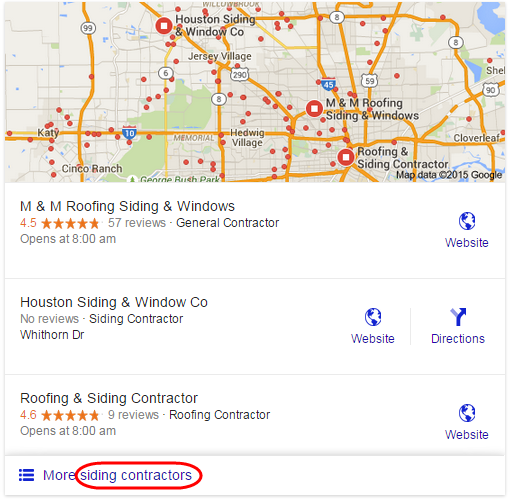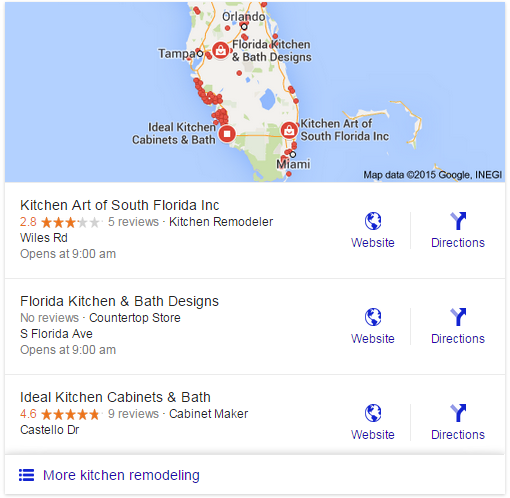Google’s dreadful new 3-pack of local results is a push toward AdWords, without a doubt. They may also pass it off as a usability improvement, but it’s mostly classic Mountain View skullduggery.
But I think it also at least hints at what kinds of local-business results Google wants to show when money isn’t involved: a handful of results for local specialists.

The same shop that ranks for “auto repair” will be less likely to rank for “transmission repair.”
The dentist who ranks for “dentist” probably won’t also rank for “emergency dentist” or “pediatric dentist.”
The landscaper who ranks #1 for “landscaping” probably won’t also be #1 for “patios.”
And so on.
Google can show relevant results for the more-specific terms (its claim to fame as a search engine), and rake in the AdWords bucks for the broad “ego” terms that tend to create absurd bidding wars (e.g. “criminal lawyer”).
I’m not saying that’s how it is right now. I think more-specialized, granular results are what Google is shooting for. As Brian Barwig has pointed out, the results still suck in many cases.
The bottom line is that I’d say the best way to get anywhere in your local SEO – by which I mean ranking well and getting customers – is to position yourself online as a specialist.
That means you don’t try to rank for every term.
It may mean your homepage plays up some service(s) more than others, and you don’t cram every last stinking keyword into your title tag. It means you don’t pick all the Google Places categories you could pick. It means you may pursue fewer links, but only ones relevant to your niche. Maybe you even rename your business.
You may already see things that way, in which case I’m preaching to the choir.
But if you’re not sure whether it’s worth specializing, consider these points:
- The quality of traffic and leads is usually better for niche terms. Sure, fewer people type them in. But those people are more likely to know what they’re looking for, and are less likely to be tire-kickers.
- It’s even harder to rank in the top-3 than it is / was to rank in the top-7.
- It’s usually easier to rank for terms where you’ve got fewer competitors.
- It’s easier to rank for fewer search terms than for many.
- It’s easier to optimize a given page of your site to one specialty (or a couple) than to several.
- If you’re considering a rebrand, it’s easier to gear your name toward one specialty.
- If you go as far as changing your business name, you’ll probably get more clicks. That’s for obvious reasons and, as Darren Shaw has shown, it can influence your rankings.
- Why do you think Google lets businesses with “keywords” in their business name rank well (often unfairly)? Why hasn’t Google followed through on removing descriptors from business names – as they said they’d do over 8 months ago? Because the name probably helps Google categorize the business. “ABC Transmission Repair” may not rank for “auto repair,” but Google will probably show it for transmission-related terms. That business picked its battles.
- You may rank in more cities, or even for statewide search terms (e.g. “Florida kitchen remodeling”). As the number of local competitors gets fewer, Google has to grab relevant results from farther away in order to fill up even a 3-pack of Google Places results.

- It may be quicker to rank. You don’t want your local SEO maybe to pay off only once you’ve put in the ridiculous amount of effort it can take (and then wait) to rank for “dentist” or “lawyer” or “roofer,” or whatever your goal is.
- You may find it easier to create better, more-focused “city pages.”
- It may make your SEO’s job easier to accomplish 🙂
- You can always branch out or broaden your targeting later.
- If you don’t rank well in the local 3-pack for some keywords you really want to rank for, you can always go after organic rankings and AdWords to fill in the gaps.
- The way things have been going, if you don’t rank well in the local pack for important keywords, you could probably just buy your way in.
Specializing may or may not make sense for your business. But I hope you’ll at least consider it. It may make life easier, it may make your local SEO easier, and it may get you more and better phone calls for your effort.
—
Do you agree?
Any reasons I missed for why you should position yourself as a specialist?
How does Google’s new 3-pack change your local SEO strategy?
Leave a comment!